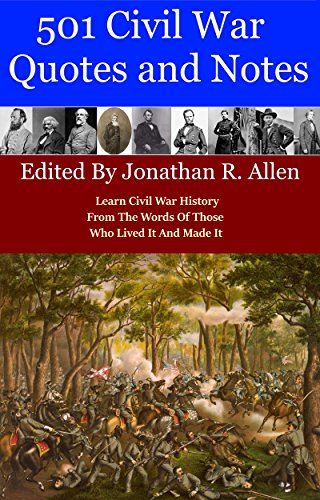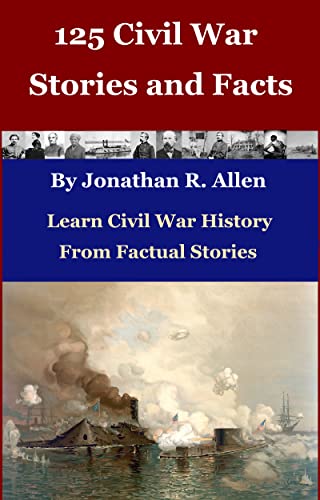Books I Have Self-Published
“I cannot live without books.” – Thomas Jefferson. A Founding Father of the United States, Jefferson was a wealthy man who could afford to purchase many books. He had a large personal library. Congress obtained Jefferson’s library of 6,487 books in January, 1815, paying $23,950 for it, which was a huge amount of money for the time. The addition of Jefferson’s personal library doubled the size of the Library of Congress.
501 Civil War Quotes and Notes
Learn Civil War history from those who lived and made the history of the Civil War.
Available as a Kindle eBook or as a paperback.
Get 501 Civil War Quotes and Notes now!
Would you like to know the thoughts and feelings of the Civil War soldiers and citizens?
Do you wonder what it was like to be living during the Civil War?
Would you like to know what happened in the Civil War?
Find the answers to these questions and learn much more by reading the words of those who experienced the Civil War first-hand.
The foundation of the United States was tested by fury and bloodshed during the Civil War, a war which ended slavery and kept the United States as a union. The people of the Civil War said and wrote much about their experiences. Learn from their words. Their words tell the story of the Civil War.
501 Civil War Quotes and Notes features quotes made before, during, and after the Civil War. Each quote has an informative note to explain the circumstances and background of the quote. Learn Civil War history from the spoken words and writings of the military commanders, political leaders, the Billy Yanks and Johnny Rebs who fought in the battles, the abolitionists who strove for the freedom of the slaves, the descriptions of battles, and the citizens who suffered at home. Their voices tell us the who, what, where, when, and why of the Civil War.
Some quotes or notes might make you stop and think. You may gain some insight into the character and personality of Civil War leaders and commanders through their quotes. Perhaps some quotes or notes will give you an idea as to what it was like to be a soldier in the Civil War, or what it was like being a citizen living in those turbulent times. Some quotes will make you laugh. The people of the Civil War could sometimes use humor to find brief relief from the loss and horror of the war.
A few examples of the quotes and notes found in 501 Civil War Quotes and Notes:
#107. “Hello, Massa; bottom rail on top dis time.”
* An African-American Union soldier to his former master, who was now a prisoner of the Yankees.
#110. “Send for a clergyman, I wish to be baptized. I have been basely murdered.”
* The last words of General William Nelson, the commander of the Union Army of Kentucky. Nelson was fatally shot by a fellow officer, General Jefferson C. Davis, during an argument in Louisville in 1862.
#130. “Captain, my religious belief teaches me to feel as safe in battle as in bed. God has fixed the time for my death. I do not concern myself about that, but to always be ready, no matter when it may overtake me.”
* General Thomas Jonathan “Stonewall” Jackson’s reply to an officer who inquired as to how he remained so calm in battle. Stonewall would die on May 10, 1863, after being mistakenly shot by his own men on May 2 at the Battle of Chancellorsville.
#230. “I am one of the dull creatures that cannot see the good of secession.”
* Robert E. Lee, 1861.
#303.
Jeff Davis rode a dapple gray,
Lincoln rode a mule,
Jeff Davis is a gentleman,
And Lincoln is a fool.
* A verse from a Confederate song making fun of President Abraham Lincoln.
#456. “This place would be quite pleasant if it had been all burned up.”
* A Union soldier from Connecticut named John Crosby voicing his opinion of swampy Donaldsonville, Louisiana. July 1863.
501 Civil War Quotes and Notes can be read from start to finish or by thumbing-through and skipping from quote to quote as you please. You’ll learn Civil War history from the words of those who lived the Civil War and made its history.
125 Civil War Stories and Facts
Learn Civil War History From Factual Stories About The War’s Military Commanders, Political Leaders, Battles, Places, Weapons, And People
Available as a Kindle eBook or as a paperback.
Get 125 Civil War Stories and Facts now!
The factual stories in 125 Civil War Stories and Facts will help you learn Civil War history. The stories are informative and entertaining. It’s a fun way to learn about the Civil War.
- Do books like Civil War Trivia and Fact Book by Webb Garrison or The Civil War: Strange & Fascinating Facts by Burke Davis interest you? Then you will find 125 Civil War Stories and Facts follows in their tradition of providing the reader with rich and interesting information about the Civil War.
- Does reading about Civil War history from long and dry academic-like books bog you down and cause you to lose interest?
- Would you like to read interesting stories based on facts of the Civil War, stories that inform you and move along with the war’s history?
- Does having to read from cover to cover tire you and cause you to drag through a book about history?
- Would you prefer the freedom to skip around in a book and learn story-by-story about the Civil War?
- Would you appreciate snapshot stories that tell about the commanders, political leaders, battles, places, weapons, and people of the Civil War?
- If you answered, “YES!” to all or most of these questions, then you will find 125 Civil War Stories and Facts as your answer to learning more about the Civil War.
Here are a few sample stories from 125 Civil War Stories and Facts:
#59. On July 2, 1861, Confederate General Thomas Jonathan “Stonewall” Jackson was sitting and resting under an oak tree at Falling Waters, Maryland. Union troops saw fit to strike a large limb of the oak tree with a cannonball. The tree limb fell and nearly landed on top of Stonewall. He could easily have been killed by the falling limb, but Jackson escaped unharmed. Stonewall narrowly missed being killed at Falling Waters by the tree limb, but death for Stonewall was certain at the Battle of Chancellorsville. In May 1863, he was mortally wounded by friendly fire at Chancellorsville. He lost an arm and apparently was recovering, but he died on May 10, 1863, of pneumonia.
#77. (Excerpt) […] A story in North Carolina’s Fayetteville Observer newspaper once told of a South Carolina man who was preparing to sell the old family farm. It was a farm that had been in his family for generations, all the way back to antebellum times. In 1864, General William Tecumseh Sherman’s troops paid a visit to the farm and left their mark of destruction. The newspaper’s reporter asked the old farmer whom he was hoping might buy his land, what he wanted the future of the farm to be. Would the farmer care if the farm would be lost and used for development, or would he prefer if another farmer would buy it? The old South Carolinian farmer replied, “I don’t give a damn or a care who buys it or what he does with it, as long as his last name ain’t SHERMAN!” […] (Much more information follows about Sherman’s surprisingly positive relationship with the South before the Civil War.)
#124. (Excerpt) White House security and access were surprisingly lax in the Civil War. If you wanted to meet with President Abraham Lincoln to talk about some matter, then all you had to do was go to the White House and request to see him. You would have to wait your turn. That wait might be a considerable length of time, perhaps days or even a week. If you were patient and your desire to talk with Lincoln was strong enough, then you would have the opportunity to meet with him. […] (This story continues with the telling of a man who came to visit Lincoln in the White House. He was an important man who was once a slave and he had influence on President Lincoln. Lincoln listened to him.)
You don’t have to read 125 Civil War Stories and Facts from cover to cover. You can thumb through to random stories and begin or end reading wherever you want. Each story is meant to stand alone, although some stories will add to or build upon other related stories. Some similar story topics might be gathered near one another in a few places, or related stories might be found throughout the book. You don’t know what might pop up next!


